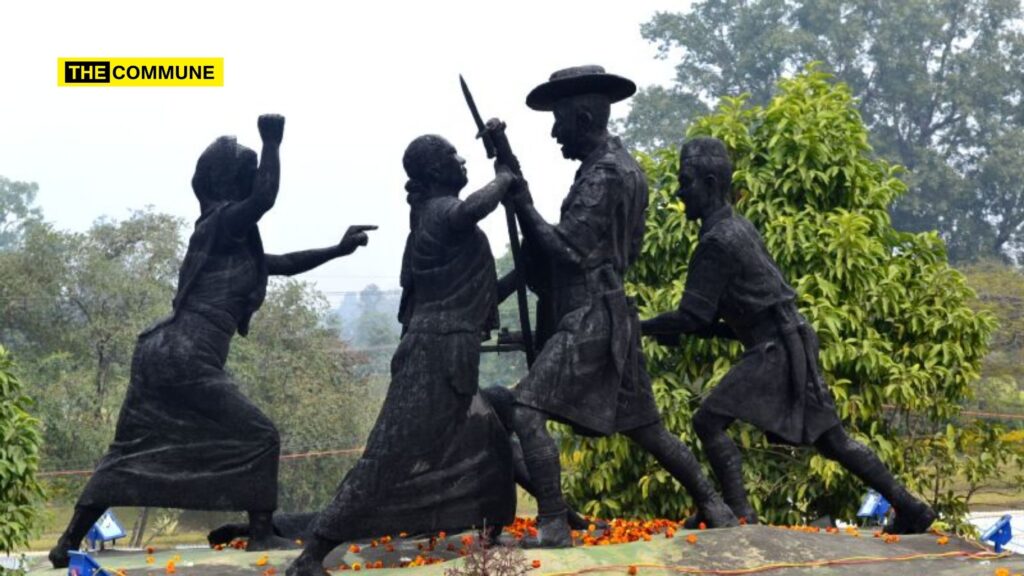The people of Manipur on Thursday paid heartfelt tributes to women freedom fighters who took part in ‘Nupi Lal (women’s war)’ against British actions in 1904 and 1939. The iconic day was commemorated as the 85th Nupi Lal Numit.
The Nupi Lal or Nupee Lal is an epoch-making struggle which broke out on December 12, 1939 against an extremely exploitative form of socio-economic and political system perpetrated by the combined feudalistic-colonial rule in Manipur. Chief Minister N. Biren Singh led the people in offering floral tributes to the departed women freedom fighters at the Nupee Lal Memorial complex. A formal function was also held at the Ghanapriya Women’s College, where addressing the gathering, the Chief Minister maintained that Nupee Lal Numit had been observed every year to remember the role played by brave Manipuri women in 1904 and 1939, revolting against the injustice of British imperialism.
He continued that apart from the contribution of women during the fight, people should also remember the bravery and courage shown by Manipuri women in other instances including ousting the Burmese (Awa) during the Seven Year Devastation period (1819-1826). Singh further mentioned that the bravery and courage could also be seen among present day women of the state, as they had been leading from the forefront in every issue pertaining to the safety of the people of the state.
He highlighted the contribution of Manipuri women in certain sectors including social, economic, art and culture, hospitality and games and sports among others, apart from their domestic activities. Cultural performances by Manipuri women in different national and international events had shown the uniqueness of the state’s culture across the world, the Chief Minister stated.
Singh told the gathering at the function that acknowledging the hard work and commitment of women, the state government had introduced certain women welfare schemes including the Ima Nongthangleima Yaipha Tengbang Scheme, providing financial assistance of Rs 500 per month to unemployed women who are above the age of 40 years. Noting that Ima markets (all-women market) had been constructed across every district of the state, considering the role of women in economic activities, Singh said that financial assistance had also been given to women sports persons in establishing training institutes and providing training to young athletes in their respective disciplines.
The Chief Minister also spoke on the initiatives of the Central Government under Prime Minister Narendra Modi in passing the Women’s Reservation Bill 2023 in Parliament. Forest, Environment and Climate Change Minister Biswajit Singh stated that Nupee Lal is observed every year to remember the courage and sacrifice of women freedom fighters and to pay tribute to their contributions, adding that the observation should be a proud moment for every Manipuri.
Referring to the two instances of Nupee Lal in 1904 and 1939 and the courage and bravery of Manipuri women in fighting against the injustice of the British imperialist, he stressed the need for everyone in the state to inherit their courage and love for the motherland. The Minister stated that Nupee Lal had brought political, social and economic reformation in the state and people should always remember that. Mentioning the contribution of women in different fields, he expressed that gender equality is necessary for bringing development in Manipur. He further stressed the need for women in the decision-making process for inclusive growth.
On December 12, 1939, a large number of women stormed the state Durbar Office asking for immediate stoppage of rice export, in which around 21 women were seriously injured by the bayonets and butts of the soldiers’ weapons. The first women’s agitation was triggered by the action of Colonel Maxwell in July 1904 to reintroduce the abolished Lallup System, wherein men were required to perform free labour for 10 days after every 30 days.
After the bungalows of two British officials were burnt down in 1904, Maxwell temporarily reintroduced the Lallup System to rebuild them. This move proved a misstep as the women rose up in unison to protest against the injustice of forced labour. After the Anglo-Manipur War of 1891, Manipur came under direct British rule till 1907, when the administration was handed over to Raja Churachand Singh and his durbar. However, a British political agent was employed to oversee the functioning of the region and had powers over the royal durbar. This had major implications on the economy and trade of Manipur.
–IANS
Subscribe to our channels on Telegram, WhatsApp, and Instagram and get the best stories of the day delivered to you personally.

